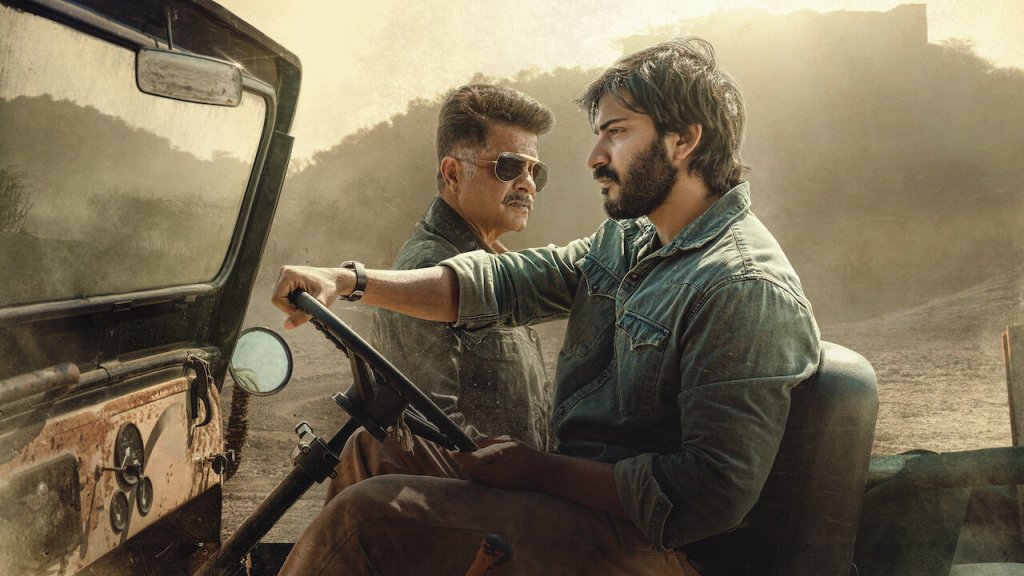By Rachit Raj
In the last few years, Hindi cinema has come up with some exciting stories that are as much a part of the American Western genre, as they are a subversion of it. If Sonchiriya was a breathtaking reminder of how the dacoits that the cinema of the 1970s and 80’s demonized had a horrified, humane side to them, Thar subverts one of the most iconic Hindi films – Sholay – in asking us an interesting question. Who is the real antagonist?
Writer-director Raj Singh Chaudhary develops this hybrid-genre narrative where the idea of an antagonist is more a case of perspective than actions. He does that by taking elements of a Western and blending them with the revenge-drama genre. The results are not always on the right pitch, but the film gets a lot of what it is trying to attempt right.
In its wonderful opening few minutes, Thar begins with Inspector Surekha Singh (Anil Kapoor) giving a voiceover. He establishes the setting of the That desert (near the Pakistan border) as the protagonist. This is established a number of times through the exquisite camera work of Shreya Dev Dube, who captures the geography of the film not just as a character, but as the soul that defines the film.
Singh is on the verge of retirement and is greeted with a “bhawandar” just before his retirement. He is accompanied by Bhure (Satish Kaushik), his professional junior and friend, as Siddharth (Harshvardhan Kapoor), a new mysterious man enters their town just as a body is found hanging by the tree, dismembered, and theft of drugs takes place amidst an air of deceit around an arranged marriage.
These are untrustworthy people with a questionable moral radar. Everyone has deep insecurities and hidden agendas, but the narrative remains loyal to Siddharth as his brooding, mysterious-new-man image grows into an antagonistic presence. Amidst a lot of torturing and traumatizing sequences is Chetna (Fatima Sana Shaikh), the wife of one of the three local men who are employed under Siddharth.
The film remains an intriguing watch while Siddharth remains an unknown presence. Chaudhary builds the tension intelligently, making a growing romantic track between Siddharth and Chetna seem like an inevitable tide towards doom that seems as natural as it looks uncomfortable.
He interjects these visuals smartly, juxtaposing the actions of the protagonist, and his love-making with this subordinated, silenced woman to keep whispering to us that this is going to end in an unhinged heartbreak for Chetna, the one character who seems to be untouched by the harsh greyness of the terrain that is her home.
The problem with Thar is its unsatisfying final act. After all the agonizing violence and almost inappropriate obsession with graphic details, the pay-off is not worth it. I understand how it may have looked like a good end on paper, but the execution feels quite damp. The only person you care for during those final few minutes are Chetna, who is never given the center stage in the narrative until that point.
There is a shot towards the end of the film of people lying dead on the sandy terrain, unmistakably similar to each other. A voiceover (written by Anurag Kashyap along with the rest of the dialogues) talks about the futility of revenge. An underlying theme of the absence of any value to life in a lawless, rugged world appears cursorily, but the film fades away before making its point land with the needed poignancy.
In another world, Thar would have been a worthy successor to Abhishek Chaubey’s brilliant directorial Sonchiriya, but this one falls a few crucial points behind. That is not to say that Thar is not a good film. It works in ways that few films do and stays with you like an uncomfortable mirror of life around us – a look at a lawless place from the past that speaks of the law-bound reality of our now. And yet, steers away from being a truly compelling cinematic work.
[Read the author’s work on his blog here]







Leave A Comment
You must be logged in to post a comment.